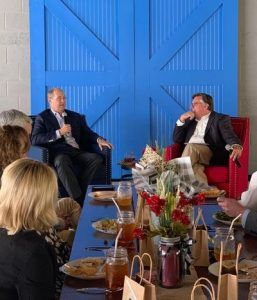Scott Ford recounts how close Alltel came to being No. 1
by October 8, 2019 5:21 pm 6,236 views

Editor’s note: This is part one of a two-part series based on an interview with Ford at Talk Business & Politics’ “Power Lunch” series. You can listen to the full conversation at the end of this story.
“What if?”
Sometimes in business, enough time passes to reflect on what could have been. Former Alltel CEO Scott Ford, now the CEO of Westrock Coffee and other investments, provided in-depth details of the go-go days of the telecom industry when the Little Rock-based wireless carrier competed for dominance with national players like AT&T, Verizon and Sprint.
Ford was the featured guest at last week’s TB&P “Power Lunch” series.
Alltel sold to two private equity groups in late 2007 for more than $27 billion before flipping to Verizon about a year later in a $28 billion deal.
In an interview with TB&P’s Roby Brock, Ford told the “Power Lunch” audience that the company made three runs at merging with Kansas City-based Sprint. The timing of the first and second efforts would have positioned Alltel-Sprint as the No. 1 mobile carrier in the U.S. It was before BellSouth and SBC got together and formed Cingular, now AT&T.
“We would have been the No. 1 wireless business in the U.S,” Ford said. “And I don’t think anybody would have ever caught us.”
The first dance with Sprint was called off after two senior managers exited the company in 2003, leaving the relationship to be rebuilt. Ford recalled how the second effort was derailed when Sprint closed a deal with Nextel, one that Ford contends was doomed from the start.
“I’m trying to sell the concept to [former Sprint CEO] Gary Forsee and he’s sitting on my couch on a Monday and we’re supposed to talk on Friday, I think. And on Thursday, he calls to cancel the meeting on Friday, and that Sunday they announce that they’re going to merge with Nextel.
“I said, ‘You cannot be serious. Size is not scale. That is a different network, different set of radios, a different set of transmission gear, a different set of handsets. Who sold you that?’ You see how that worked out,” said Ford.
The final run at Sprint came right before the private equity deal in December 2017 with TPG Capital and GS Capital Partners for $27.5 billion.
“We sent an emissary to say – I think they were in the like $14 [per share range] and we said we’ll give you $19. So we’d bid them $36, $26, $19 and they went to $6 or wherever they are now. So be it,” said Ford, who now sits on the AT&T board of directors.
Ford also said there were two attempts to buy T-Mobile, which is now looking to merge with Sprint. He declined to share details of the T-Mobile effort.
TRANSITIONING FROM STEPHENS
Before Alltel, Ford spent nearly a decade working at renowned Stephens Inc. serving with Warren Stephens, Witt Stephens and Jack Stephens.

Jack Stephens and Scott Ford’s father, Joe, then the CEO of Alltel, had been discussing for nearly a year that Scott would move over to Alltel as it entered a critical growth stage in the late 1990’s. Scott Ford had been mentored by Jack Stephens and he recalled the day he left for Alltel.
“I was standing in front of his desk where we’d spent 10 million hours because I would literally sit across from him all day long while he was on the phone. I sat there and then when he got off, we talked,” Ford said.
“So I stood up and I turned back to him and said, ‘I don’t know anything about the telecommunications business other than growing up in Joe’s house. I don’t know anything about it.’ And he said, ‘Well, the nouns are different, but the verbs are all the same. You’ll do fine.’
“It sounds, it’s funny now, but the core of it was true, which is he had spent 10 years teaching me how to think through the specifics of decision-making at a strategy level in a business,” Ford said. “The basic issues are the same. You’ve got to get the guys to come play ball. You got to get the right guys to come on Sunday afternoon to play ball. And that’s a network and an individual relationship factor. Once you get the right guys, you’ve got to get the goals agreed to among them. You’ve got to get a comp plan that motivates them, so that they’re now working for something beyond themselves. They’re working for the team’s acquisition of its goals on its way forward, and they get to go home and have a nice report card at home. So if you can get that, it really doesn’t matter what the business is.”

When he first came to Alltel as the chief operating officer, Scott Ford said his first goal was to serve his father, who was about five years away from retiring. His second goal was to figure out how to grow the business in an unchartered industry landscape. Quickly, he learned he really wasn’t out of his league because no one knew where the wireless business – a revolutionary technology that was transforming commerce and lifestyles – was going.
“Look in the wireless business in the mid-90’s, nobody had much experience in the wireless business. Right? I mean a few people had been around it for a few years. It was about the cumulative experience around, so experience thankfully wasn’t a criteria,” he said.
Ford went to his trusty yellow notepad and started conjuring up scenarios to move Alltel’s stock price from the mid-twenties to $100 per share.
“We were exactly at $33 [per share] and what do we have to do to get to $100 per share? I actually shared my thinking with a couple of senior executives, one of which literally looked at me and said, ‘You are crazy.’ And not long after, he left the company,” he said.
Ford said the company did cross the $100 per share threshold, albeit eight years later, but the plan and management team he put in place to achieve that goal is what took Alltel to its heights.
DECISION TIME
Alltel grew rapidly in the 90’s and 2000’s through acquisitions and organic growth. By the mid-2000’s, it was the fifth largest wireless carrier in the U.S. having grown to nearly $9 billion in annual revenue. It had operations in 34 states, roaming agreements in all 50 states, and had approximately 13 million subscribers.
When the time had come to consider the multi-billion dollar private equity sale, Ford said he sought out two business icons for advice: Omni Hotels Bob Rowland and the late billionaire energy tycoon T. Boone Pickens.
“If I’ve got a major decision, I try to find two or three people who don’t have an interest in that decision that I can go sit down with and just say, here are all the cards I see. We could play them this way, that way, this way, that way,” Ford said.
Rowland told Ford that despite not knowing the wireless business, he felt like the equity markets, interest rates and credit availability were at a peak. There might not be a better time to get maximum shareholder value, he advised.
“If you think you have a fiduciary responsibility to your shareholders, you’re never going to get a better opportunity than right now and you should take it. That was Bob’s advice. I think he was right,” Ford said.
Pickens described his ouster from Mesa Petroleum to Ford. What he considered to be the worst day of his life turned out to be the best. Pickens was able to apply the business acumen of his Mesa days to new businesses later in life that led to his billionaire status.
“‘I was able to take what I had learned, running a business in an industry, and apply those concepts across money management across companies in an industry. And it turns out that that’s where I ended up making my net worth,'” Pickens told Ford.
He counseled Ford that despite the ramifications of selling, especially the impact it might have on the company’s employees, it would present new opportunities for all involved.
“‘You’ve got to put the serious tug of tragedy aside and don’t quite take it so hard. There is another chapter in your life, even if you don’t know what it’ll be, and there will be in everybody else’s life that’s impacted,'” Pickens told Ford.
Ford has thrust himself into several new business ventures post-Alltel. Westrock Coffee is thriving; his investment firm is taking new leaps; and he’s even expanded his life-long passion for horses into thoroughbred racing. Those topics will be the subject of part two of this two-part series.
Podcast of Scott Ford “Power Lunch” conversation:
